Affiliate disclosure: This post may contain affiliate links. Please see our Privacy Policy.
Abandoned ducklings are unfortunately all too common, whether from domestic or wild ducks. Ducks can sometimes be unpredictable mothers, and discovering lone ducklings left to fend for themselves is a heart-wrenching experience. Their vulnerability pulls at your heartstrings, especially knowing how quickly they can become prey or drown.
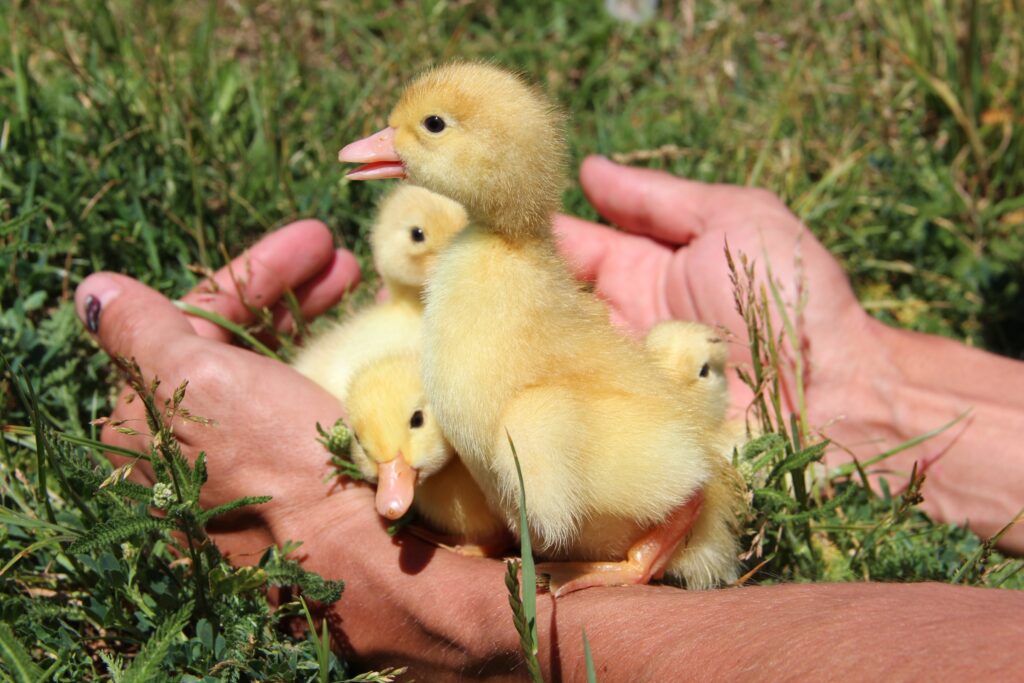
Both wild and domestic ducks will abandon ducklings, and they usually don’t make it more than a day or two. Wild ducklings are vulnerable to predators and drowning without a mother to guide them. Domestic ducklings are attacked by other birds in the coop without a mother hovering over them.
Some ducklings are sometimes abandoned almost by accident.
In our case, a mother duck hatched out a clutch of 12 and stopped sitting. She still had 4 eggs left in the nest, but something told her that an even dozen was enough!
A young (1-year-old) duck without a nest of her own decided to sit on the nest once their mother had left, and managed to hatch out 4 more ducklings from the surplus eggs they’d abandoned. Unfortunately, she wasn’t very interested in mothering them.
A duck that already has babies will often adopt abandoned ducklings, so long as they’re about the same age as her own. Perhaps her mothering instinct is strongest right after her babies hatch, or perhaps she just can’t tell them apart.
With a 2+ week difference in ages, the current mothers are not willing to take on extra responsibilities.
Not only do they not adopt the new babies, but they’ll actually go out of their way to attack and try to kill them. Two ducklings were found dead, and two more were hiding in a corner trying to avoid the cranky group of mother ducks.
Time to intervene and hand raise some fluffy cuteness, but what to do with abandoned baby ducks?
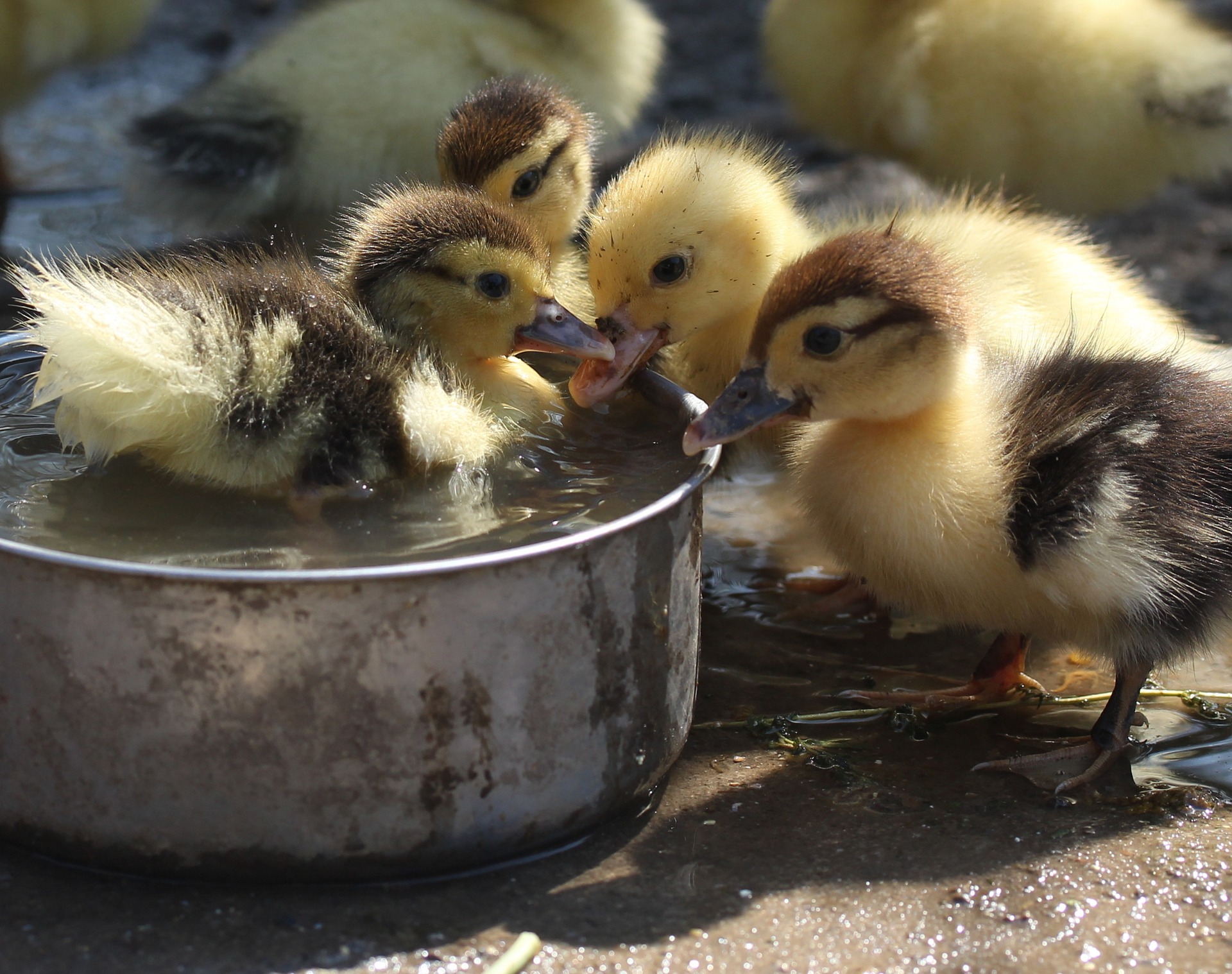
How to Care for Ducklings
So long as they’re well cared for, ducklings can be re-introduced back into the flock with no issues.
It takes about 6-8 weeks for ducklings to become self-sufficient. If you’re caring for abandoned ducklings, make sure you plan on housing for at least that long.
Housing
When it comes to housing, simplicity works wonders, but safety is key. Ducklings need a space where they can feel secure, warm, and dry. A cardboard box will do in a pinch, but we quickly learned that something a little more durable, like a Rubbermaid tote, works much better. Ducklings are surprisingly messy, and a tote keeps the bedding in place, making cleaning much easier.
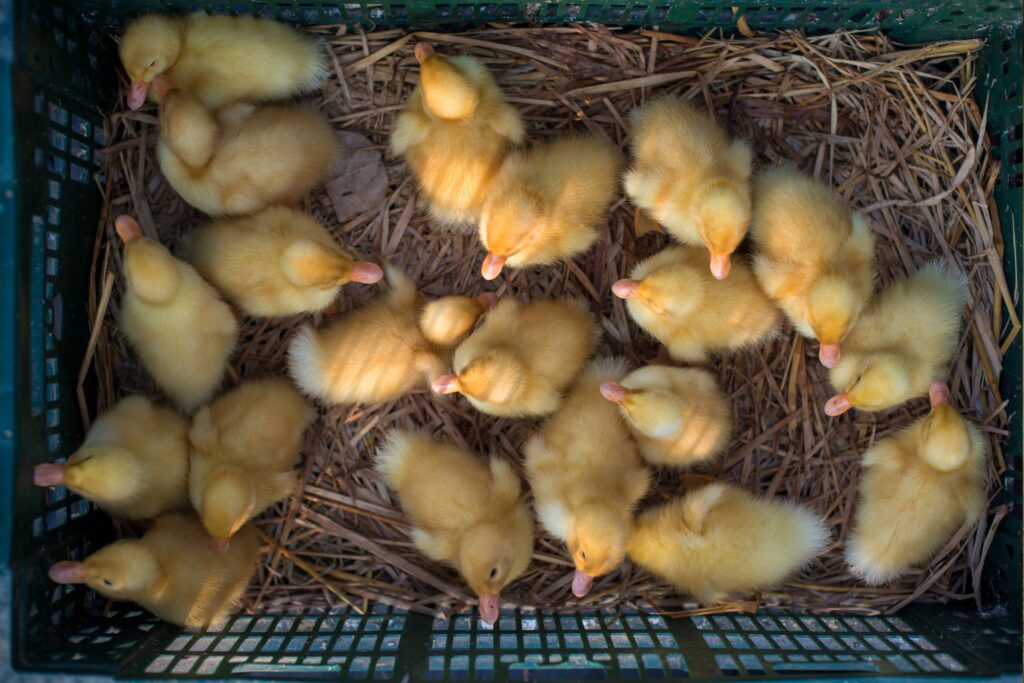
Now, when it comes to bedding, this is where we really learned the hard way. Ducklings are naturally wet creatures, especially when they splash around in their water. They’ll get everything soaked in no time! Make sure you provide a good, thick layer of bedding—about 1-2 inches deep—to soak up the moisture and keep them dry and warm. Straw, hay, or dry grass work best, but you can also use leaves. The key is ensuring the bedding is absorbent enough to keep them from getting cold and wet.
Paper towels are also an option for the first few days, especially for cleaning up, but be ready to change them daily since they get soaked quickly.
Feeding Ducklings
When it comes to feeding ducklings, the most important thing I learned is that they’re hungry little creatures, and their nutritional needs are different from chickens.
While chicken feed can work in a pinch, it’s not ideal since it’s typically lower in protein. Some commercial chicken feeds are sometimes medicated, which can be harmful to ducklings, so if you find yourself in a situation where chicken feed is all you have access to, make sure it’s unmedicated.
That said, the best option for ducklings is a high-protein game bird starter crumble or a mixed flock starter crumbler. This feed is formulated to meet the specific needs of young waterfowl and will give your ducklings the protein and nutrients they need to grow strong and healthy. It’s a great choice, and I found it made a huge difference in the growth rate and overall health of our ducklings.
Ducklings should have free access to food and water at all times. Set up a feeder that they can access throughout the day, so they can nibble whenever they’re hungry. They’ll regulate their own intake, and as long as the feed is available, they’ll be just fine.
In addition to their main feed, ducklings enjoy snacking on things like chopped greens, bugs, and even small pieces of fruit, but keep those treats in moderation. A little greenery like dandelion leaves or kale can be a great addition to their diet and give them some extra nutrients, but their main food should be the high-protein crumble to ensure they grow properly.
Water (& Drowning Concerns)
Don’t forget water—ducklings are obsessed with water, and it’s essential for digestion and keeping their little bodies hydrated. Make sure they have access to clean water at all times. I found it was helpful to keep their water in a shallow dish or a small trough, so they could drink and splash around without making too much of a mess, though they always seemed to find a way to get wet no matter what!
Ducks are water-loving creatures, and they go through far more water in a day than chickens do. However, when it comes to young ducklings, water needs to be managed carefully. For lone ducklings, the water should be very shallow, and it’s important to set it up so they can’t climb into it or get stuck. At this stage, safety is key.
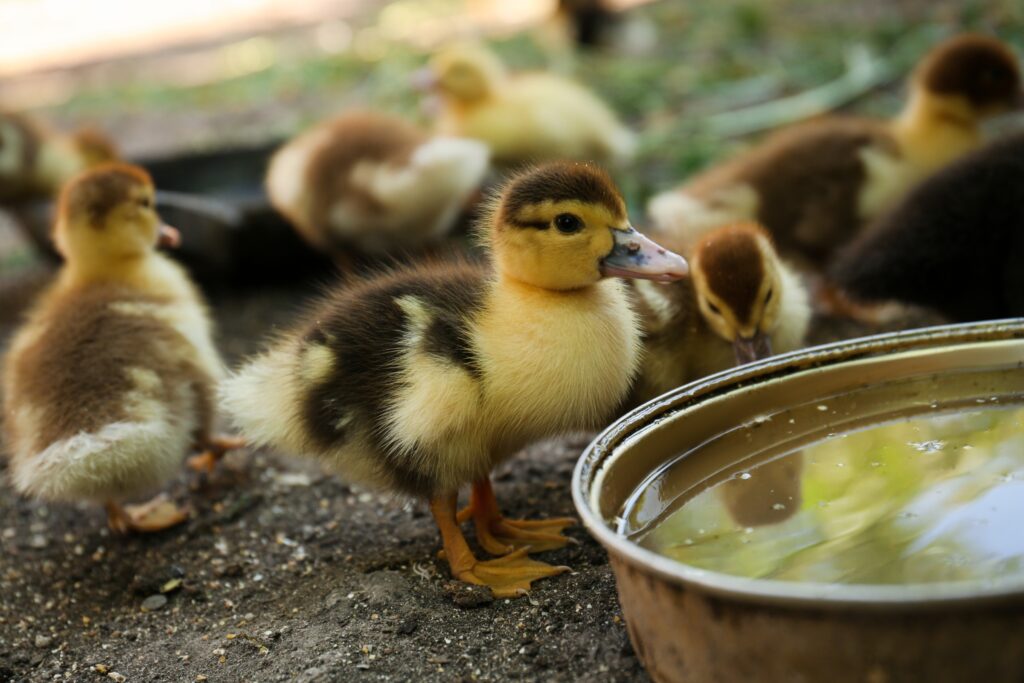
Very young ducklings are especially at risk of drowning because they don’t yet produce the natural oils that adults use to keep themselves dry and buoyant. While they may get a small amount of oils from their mother through contact, this doesn’t provide the protection they need for swimming. Even though a mother duck can take her ducklings for brief swims, she knows their limits and ensures they don’t get too wet.
For this reason, you should avoid giving ducklings access to deeper water until they’re mostly feathered in. I learned this lesson the hard way when I found our 4-week-old ducklings had become waterlogged and drowned in only 6-8 inches of water. It’s heartbreaking, and it’s one of those lessons you don’t forget.
In the beginning, their water should be just enough for drinking and dipping their beaks in—nothing deep enough for them to crawl into or swim in. As they grow and start developing their natural oils and strength, you can gradually increase the water depth, giving them more freedom to explore safely.
Remember, as much as ducks love the water, their safety should always come first. Keep water shallow and supervised until they’re ready to fully enjoy it.
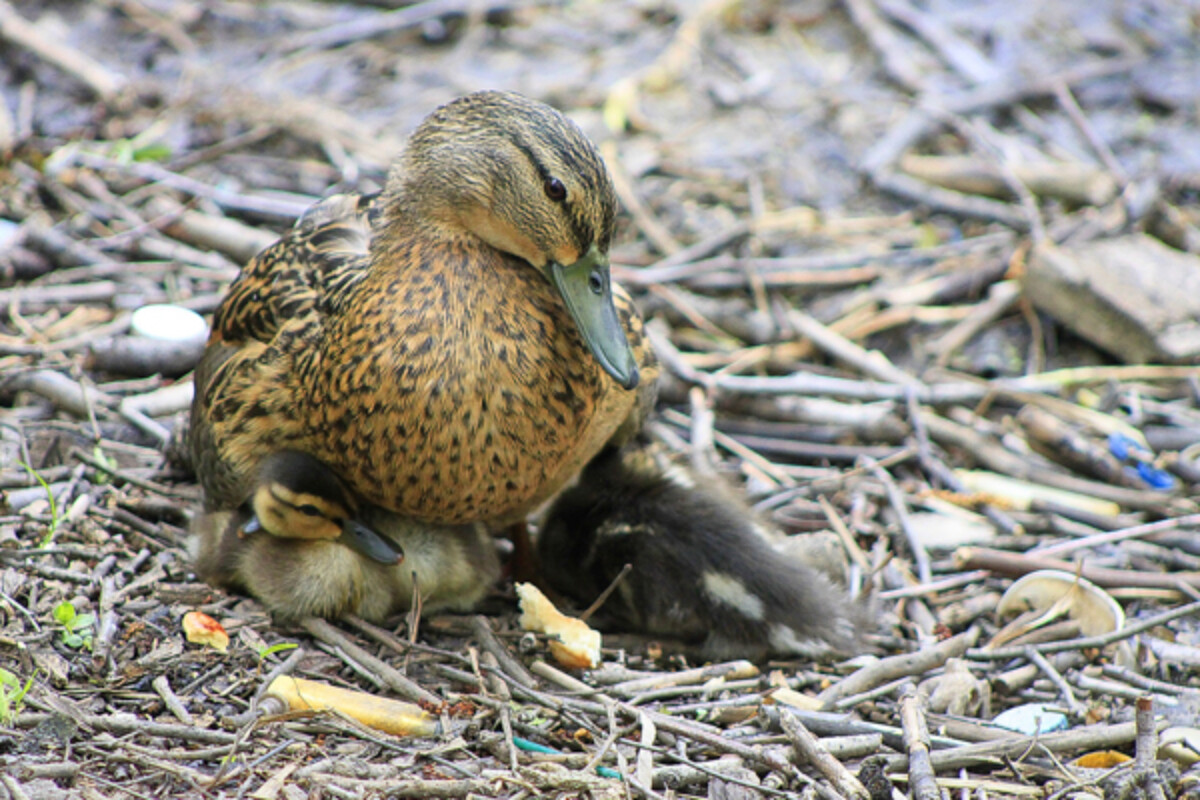
Heat
You’ve probably read all over the internet about heat lamps being a must for ducklings, but here’s the thing: they don’t always need them. We learned that lesson after our first year brooding ducklings. In those early days, I had the heat lamp going around the clock, making sure they stayed warm, but that heat lamp quickly drained our off-grid homestead’s batteries. After a few cloudy days, we were left with no power—and worried ducklings.
Since then, we’ve brooded ducklings without the need for a heat lamp, and I can confidently say, it works just fine. Over the years, we’ve raised ducklings in a box in the garage throughout June, July, and August—and we’ve never lost a single one. The warmth of the garage, combined with good bedding, was all they needed to stay comfortable and happy.
That said, if you have access to power and want to provide a little extra warmth, a heat lamp could be a nice touch. Plate style heaters that the ducklings walk under are much safter than bulb style heaters (which can be a fire hazard), and they’re what I’d recommend.
In a pinch, you can use a hot water bottle, wrapped in a towel and replaced frequently. It’ll keep them warm in chilly weather, provided they in an indoor location with protection from the elements.
Time and Care
Ducklings are fast growers! Depending on the breed, they’ll usually reach full size in about 8-12 weeks. But during those first six weeks, they’ll need your attention and care. They can’t be reintroduced to the flock until they’re big enough to hold their own, which means you’ll need to keep them safe and fed until they’re ready.
For us, the time spent brooding those first few weeks became an unforgettable bonding experience. I can still picture their little faces peeking up at me, their tiny beaks chirping as I filled their water bowl. It wasn’t just about keeping them alive; it was about giving them a strong, healthy start in life.
Once they’re ready, the ducks are integrated into the flock, and you get to watch them thrive.
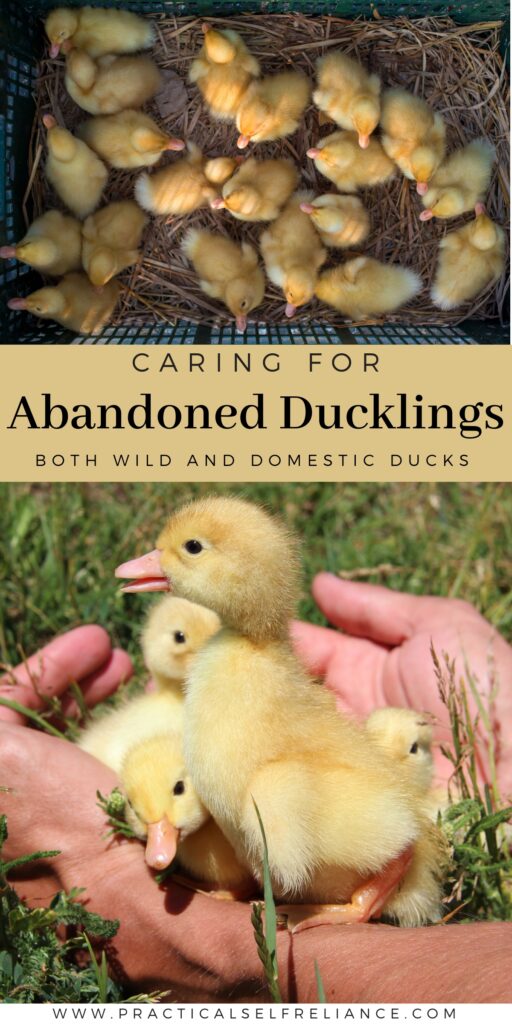
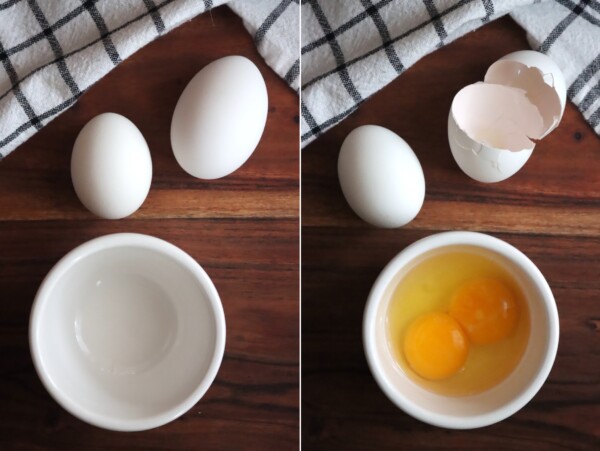
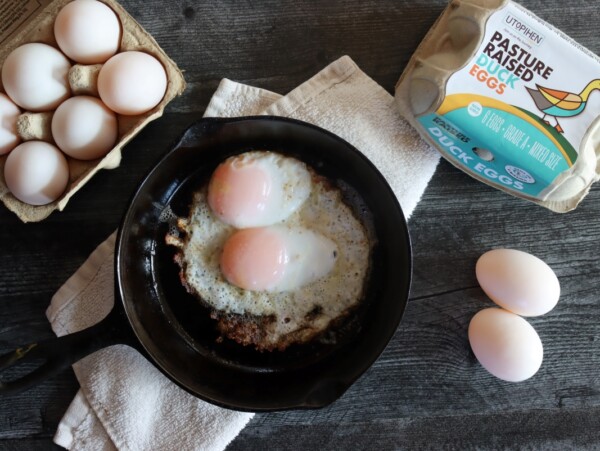









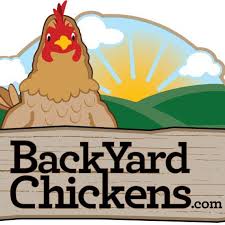
Hello, I have a duck nest in my backyard. This morning I saw the Momma duck swimming in the pond behind my house with two of her babies. There are still four eggs left in the nest, and one baby duck has passed. I haven’t seen the mom return since this morning. Will she come back for the eggs or is there anything I can or should do? It is pretty cold where I am at.
If you have an incubator, you can try putting the remaining eggs in the incubator to see if they hatch. I have found that with chickens and ducks both that once the babies start getting mobile, mom usually focuses her attention there.
I LIVE IN COLORADO. I SEE A DOMESTIC DUCK THAT HAS BEEN IN THE IRRIGATION DITCH FOR ABOUT 6 MONTHS. I IS ALWAYS BY IT’S SELF. YESTERDAY, I SAW THE DOMESTIC DUCK (JADE) SWIMMING WITH THE WILD DUCKS. I AM WORRIED BECAUSE IT IS STARTING TO GET VERY COLD AT NIGHT AND THIS DUCK CAN NOT FLY. I HAVE JUST STARTED FEEDING THE DUCK SOME CORN ETC. THIS DUCK IS ALONE. SHE LOOKS VERY HEALTHY! WHAT DO YOU THINK I SHOULD DO. I REALLY WANT HER TO THRIVE. HOWEVER THIS IRRIGATION DITCH DOES FREEZE. ANY IDEAS.
Is she able to walk out of the ditch at all?
Hello I found a baby Muscovy duck about a week ago, not sure how old it is but I’ve been caring for it. It growing fairly quick but it’s been sneezing pretty often with discharge. What can I do for it?
I don’t know what to do there, but I hope he’s ok!
I live in S FL w many ponds creeks canals nearby. At the Publix grocery store Mom Duck has 12 ducklings. It is Aug 27. How old are they? I want to capture some to bring to the pond. When? I saw one swim in a rain puddle. Is it ok to take them? I sprinkle good bread crumbs daily so the are getting used to me. Pls contact me asap. TY!!!
I don’t think I would recommend capturing wild ducklings to bring to your pond. This post is really just about helping out those that have been abandoned by their mother.
I found two abandoned duck eggs in my yard. They’re mother layed them and never came back. I took the eggs inside and put them in a plastic container with some grass and towels and put a light over them. Will this be enough for them to hatch? Also, how do I care for them if they do hatch?
Here is a helpful article on hatching duck eggs from Cornell University. https://www.vet.cornell.edu/animal-health-diagnostic-center/programs/duck-research-lab/hatching-duck-eggs#:~:text=Set%20the%20temperature%20at%2037.5,of%204%20times%20a%20day.
A duck had made a nest in my yard and had started to lay eggs but then my little sister scared the duck away because she tried to play with it. The mama duck left 2 eggs and never came back. It has been about 3 days and she still hasn’t come back to sit on the eggs. Should I grab the eggs and try to save them, or will she come back?
She should have come back by now. It may be too late for the eggs. I’m not sure how long they can go without the mama sitting on them but it is worth a try.
We have many baby ducklings being hatched now. One got away and we had to rescue from pond. Mom won’t have anything to do with it. It seems to have just been hatched, as its eyes aren’t open yet. We are doing everything mentioned above and it sleeps on my chest periodically throughout the day. I have a shallow bowl of sugar water and soften feed for her. She sits in it a lot and I change it regularly. My question: Is it normal for her not to really be able to walk? Also, she trembles constantly unless being rubbed and soothed. Could it be some kind of nerve damage?
How long has it been since it hatched? Is it still in the same condition?
Mama mallard left 5 unhatched eggs in her nest and left. My husband put them in our incubator and we now have 5 very sweet 4 week old Mallard ducklings. We now have them in a dog crate (predator proofed) halfway in our pond and halfway out to prepare them to be free.. We have done this before with our Blue Swedish ducklings and it works wonderfully. Our 2 Blue Swedish stayed and roam free on our property and the pond. Question though; will mallard babies fly away once they’re old enough?
They will fly and may leave for short amounts of time and then return, eventually staying out for longer periods. There is a good chance that if they have grown up on your property and there is plenty of food and water that they may decide to stay.
A mama Mallard was down to four ducklings. The males kept harassing her and she appears to have fled and not come back. It’s been about three days.
We first started seeing the ducklings 20Apr swimming with their mother in the pond. They are at least twenty days old. They can swim and forage. They don’t have their adult feathers yet, but are about double size from fresh ducklings.
The geese let them hang out sometimes and they are in a fenced apartment complex.
Can they make it on their own?
I would say that if they are swimming and foraging on their own then I would say they have a pretty good chance.
Hello
I am happy I came across your page, I live in Florida and we have wild ducks around our houses all the time, I usually buy food for these birds and they come and eat, one was always around my house, one day I came back to my home and I saw this duck injured. I think
she maybe was flying and a car hit her, she is in bad shape, her leg was broken and her wings destroyed :(, I thought she was gone a day, now she is always alone and she is moving more but she can’t fly or walk with two legs, I tried to put a bandage on her leg and I give her food lately, I tried to call to rescue but no one answer, I need your opinion of how to take care of her or what to do
Thanks a lot!!!
There might not be any more that you can do for her. You could maybe check to see if there are any vets near you that would check her out or maybe try the department of natural resources in your state, but other than that I am not sure what else you could do.